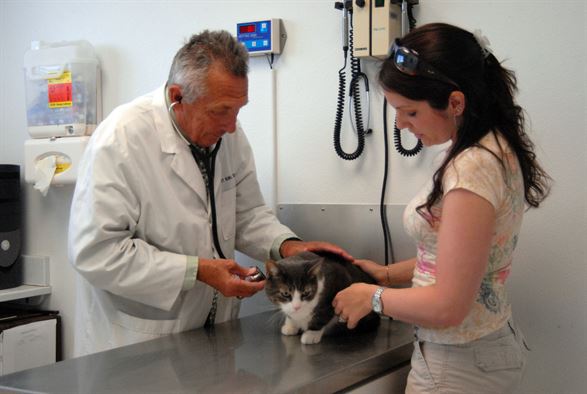
At Humane Society of Broward County we’re celebrating National Bring Your Cat to the Vet Day with – wait for it – five reasons to take your cat to the vet.
Cats hide illness well. According to the American Humane Society, cats go to the vet almost half as much as dogs. This makes cats less likely to receive preventive care, which is extremely important for the long term health of your pet.
Why do cats get less attention in this area? One reason may be because cats show few obvious signs of sickness – a defense mechanism that goes back to their days in the wild avoiding predators. Unlike dogs, which may pant excessively or cry when something is wrong, cats can be more subtle. When feeling sick, cats often hide from their owners who may not notice a problem until it’s too late.
Health risks native to South Florida. The hot and humid environment here makes South Florida a particularly fertile breeding ground for insects and bacteria that can cause disease in pets. While it’s true that big dangers such as heartworm disease and leptospirosis bacteria mostly affect dogs, cats with comprised immune systems can also be susceptible to these aliments. Also be aware that indoor cats can still come in contact with these insects and bacteria. Regular vet visits can safeguard against these dangers, keeping your cat up-to-date with vaccinations and flagging immune system issues before a cat is exposed to anything harmful.
Bigger isn’t always better for cats. One of the most common health issues among cats is obesity. More than half of American cats are considered overweight. Well-intentioned owners who shower their cats with affection (and copious amounts of treats) may not realize their chubby cat could have a health serious health issue. Overweight pets are more common than ever, skewing what people think a “normal” pet should look like. However, vets are trained to know what your cat’s ideal weight should be. And frequent visits to the vet can keep your cat’s weight on track. A vet can catch a cat’s weight problem in its early stages and take gradual and gentle steps to maintain a healthy weight, avoiding the need for more drastic and difficult ways to restrict the cat’s diet.
Cats need the dentist too. Many underlying health problems in cats are caused by poor dental hygiene. Cats aged three years and older have an increased risk for periodontal disease. Pet owners are often fooled by persistent myths like “pets always have bad breath” or “dry food protects against tooth problems.” These myths can make some owners complacent and cause serious problems to be overlooked. However, pets need regular to dental care – beyond over-the-counter solutions like dental treats — to prevent major issues later on.
A vet visit doesn’t have to stressful. Many pets experience stress and anxiety when going to the vet, especially cats, which don’t often leave the home. One recent survey found that 58 percent of cat owners reported that their pet hates going to the vet.
But some simple steps can make for a smoother visit. The first one is choosing the right pet carrier. Make sure the carrier is well ventilated and large enough to accommodate your pet.
Also, prepare for a visit by making your cat’s carrier a comfortable and welcoming place. A few days before the visit, bring out the carrier and put familiar items like treats, toys and a favorite blanket inside. Sprays are also available that may encourage the cat enter the carrier. Leave the carrier out and the door open, so your cat can get accustomed to the space on its own terms.
Once your cat becomes comfortable inside the carrier, see if you can take a few short car trips with your cat. A trip to vet shouldn’t be the only time your cat rides in a car.
